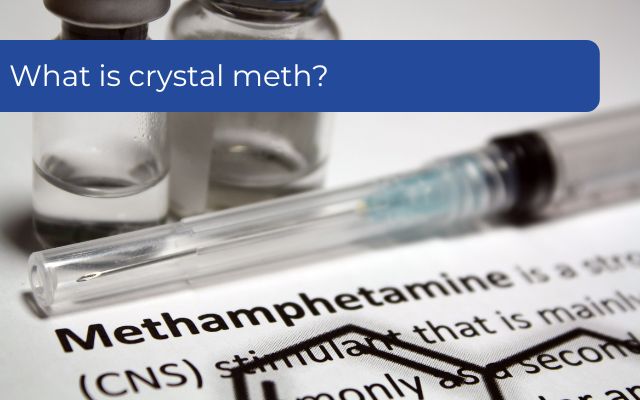
Understanding Crystal Meth Risks and Effects
How does crystal meth affect your body and mind, and what are the short and long term health risks?
If you have been asking the question, what is crystal meth? we answer that question in this post, and include information on how it’s used, how it’s experienced by the user, the long- and short-term side effects, and conclude with the street names.
“When you can stop, you don’t want to. And when you want to stop, you can’t. That’s addiction.”

What is crystal meth?
Methamphetamine or meth is a highly addictive and powerful stimulant that affects the central nervous system. Crystal methamphetamine or Crystal is a form of the same drug that looks like gleaming shards of glass or quartz type rocks. It is an odourless, colourless form of d-methamphetamine, a synthetic psychostimulant.
How is meth used?
Methamphetamine is used by means of smoking, swallowing (in pill form), snorting or injecting. The “high” produced by the drug begins and ends quite quickly resulting in a “binge and crash” pattern of use. Some people take methamphetamine in a form of binging known as a “run” where food and sleep are neglected as they continue to take the drug every few hours over a number of days.
How is Meth experienced by the user?
The brain is made up of chemicals that transmit messages to the body. Methamphetamine affects a number of these transmitters but acts predominantly on dopamine – the pleasure neurotransmitter. When methamphetamine is used, an excess of dopamine is released into the brain causing users to experience a euphoric state. Unlike normal brain function, the dopamine released is not recycled and stored for later, which then overstimulates the brain. Instead, it remains in the body until the high is replaced with a crash of uncomfortable feelings. In order to replicate that feeling and avoid the crash, more of the drug at higher doses are required.










Short-term effects of meth use
- Increased wakefulness and physical activity
- Decreased appetite
- Faster breathing
- Irregular/rapid heartbeat
- Increased blood pressure and body temperature
Long-term effects of meth use
- Excessive weight loss
- Severe dental problems – “meth mouth”
- Severe itching, leading to skin sores (scratching)
- Anxiety
- Negative changes in brain structure and function
- Confusion
- Memory loss
- Sleeping problems
- Violent behaviour
- Paranoia and hallucinations
Withdrawal
Withdrawal from methamphetamine will occur when a regular user of the drug attempts to stop using it or is unable to get it. The symptoms of withdrawal usually include:
- Constipation
- Diarrhoea
- Clammy skin
- Headaches
- Red, itchy eyes
- Joint pain
- Irregular heartbeat
- Shaking
- Hyperventilation
The worst effects of meth withdrawal usually manifest within the first few days of detox. Although symptoms do subside within one to two weeks, some of the withdrawals may continue for several weeks.
Meth addiction reduces coordination and research further indicates that long term verbal learning processes may be impaired. Emotional and memory problems are also symptoms of meth addiction.
It is recommended that addiction to methamphetamine be treated by addiction specialists within a registered rehabilitation centre. Addictions professionals are able to assist the patient through the detox period and with the long-term treatment plan.
Methamphetamine Street Names
Street names: Meth, Tik, Chalk, Crank, Crystal, Fire, Glass, Go Fast, Ice, Speed, Tina, Trash, Crystal Meth, Ice, Glass. Methamphetamine or Crystal Meth, Ice, Speed, Fast, Up, Whiz, Crystal.
There is always help and there is always hope and help available. Changes Rehab Johannesburg is here to guide and support you through each step.
Call 081-444-7000 or email [email protected] to get the help you need today.
Find how crystal meth affects body and mind, the short and long term health risks and signs to watch for to protect yourself or a loved one and find local help.. Changes team counsellors are here to help you.Crystal Meth Effects On Body And Mind Explained Now








